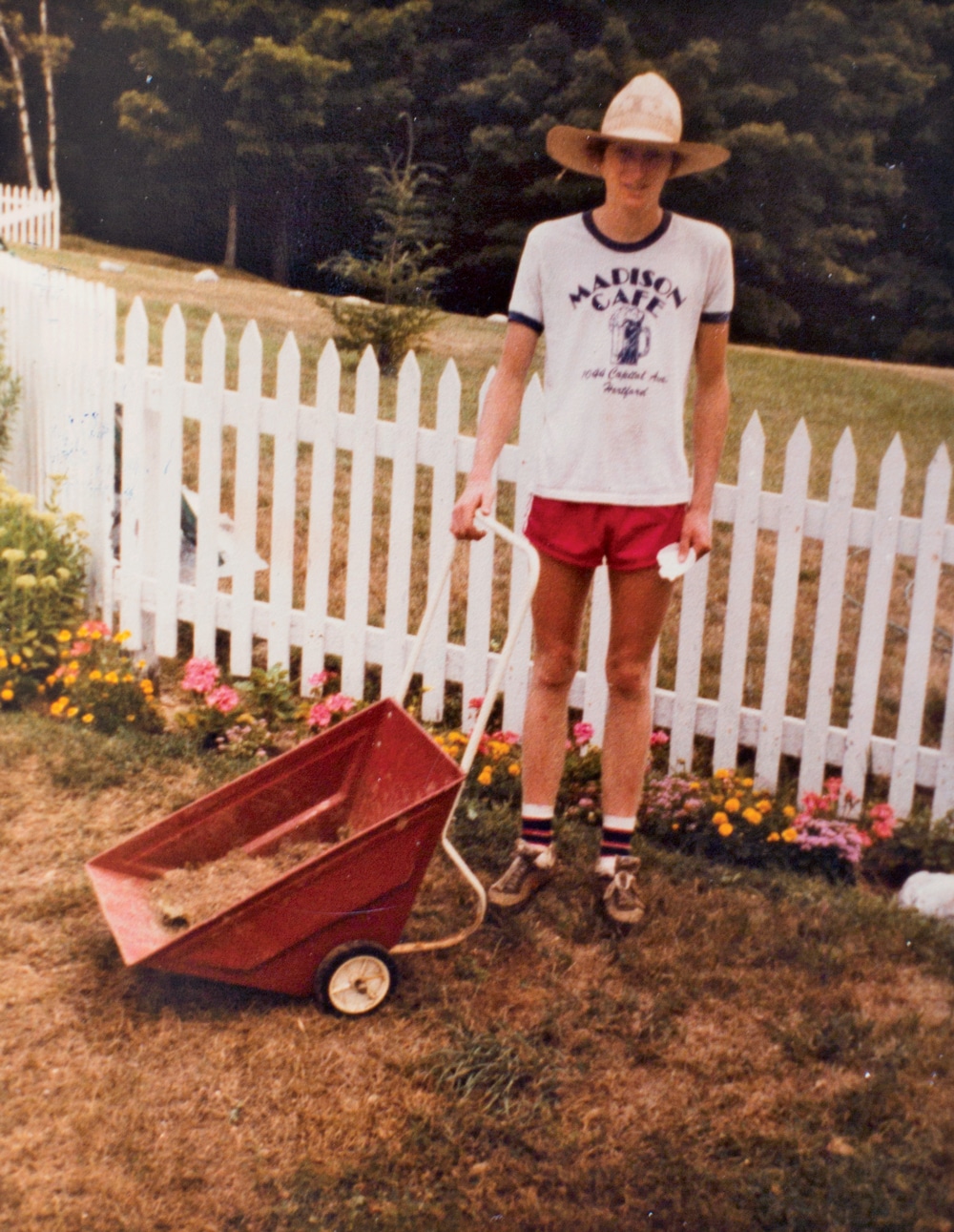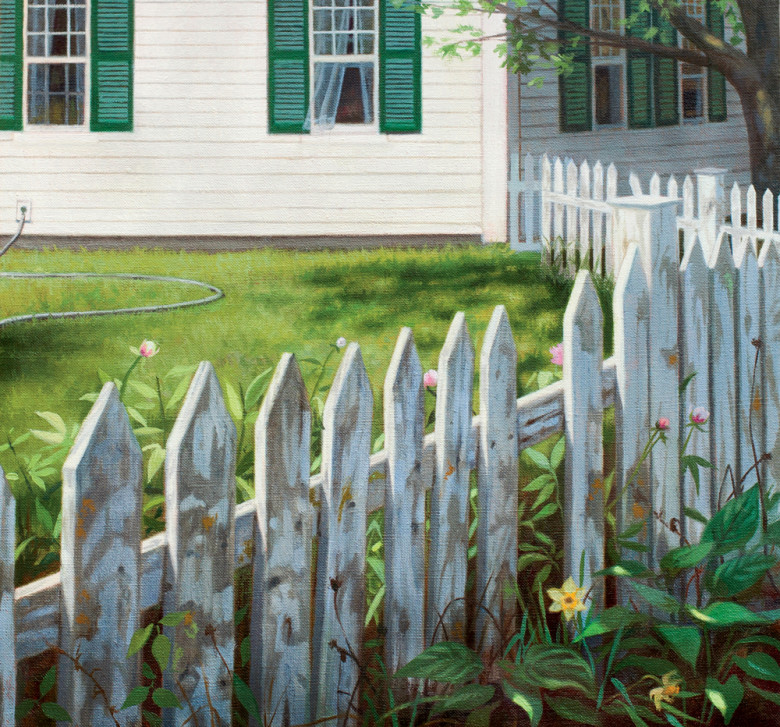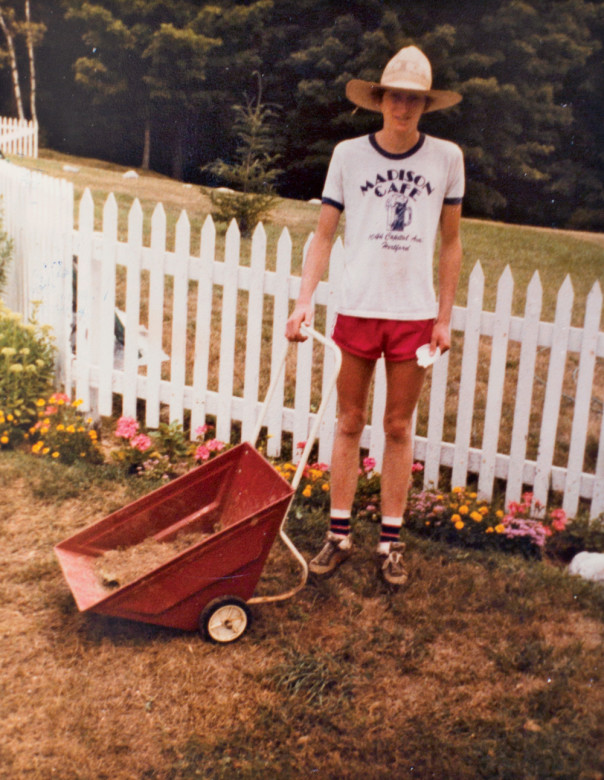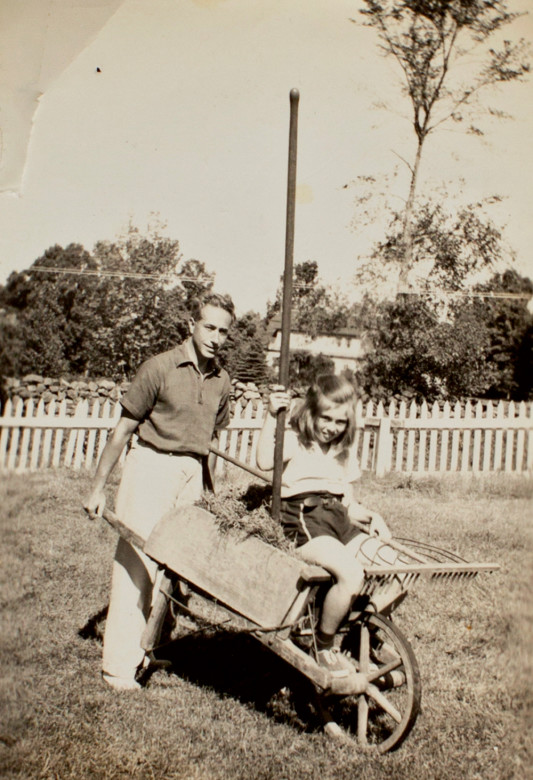Painting the Fence
What began as a routine chore became an unexpected promise to keep in this touching essay by Bill Donahue.

The author, c. 1982,
dutifully weeding near the
fence for his grandmother.

Photo Credit : Illustration by Cindy Rizza
By Bill Donahue
It was my intention, upon arriving at my family’s longtime summer home in Gilmanton, New Hampshire, to tear down the white picket fence lining our front yard. It was speckled with moss, and tilting. It was rotting in many places, and though my daughter, Allie, had painted it six years ago, a lot of the paint was gone, erased by the cars that hiss by, kicking road salt up into our yard. The fence looked abysmal, and to me it was a useless accoutrement to the rambling, idiosyncratic farmhouse that my great-great-grandfather, a New York cigar merchant, had bought in 1905. The fence was a hollow gesture at quaintness, and it symbolized the futility of human endeavor. Allie had labored to make it resplendently white; now it was a gray eyesore amid the gray snow of late spring. The fence was bound for the dump—and I was not the only one to believe it belonged there.
“Painting that fence is punitive,” said Scott, my carpenter. “We’ll just throw it in my truck and you’re done.”
I liked the simplicity of Scott’s plan, but I have to admit I never felt spite for the fence. And before we ever got around to our dump run, the environmentalist in me reckoned that the fence could at least be reused. I put an ad up on Craigslist: “100 Foot Picket Fence. Free.” In less than two hours, I heard from seven people. I decided to edit the ad so that it read, “100 Foot Picket Fence. $300.” Over the course of a week the revised ad failed to elicit a single response.
Meanwhile, the fence just sat there. I walked past it every day, and it was familiar to me. I remembered that I had painted it once myself, in June 1983, when I was 18 and living in the house by myself for the first time ever. My grandmother was away somewhere, which put me in an expansive frame of mind. Taking a cue from Thoreau, I decided to live that week without watches or clocks, outside the strictures of time. A couple of times I rose at what must have been 3 or 4 in the morning and painted the fence in the cool dark before dawn. Once, when I thought it was about lunchtime, I phoned my mom. “Why are you calling us at 6:30 in the morning?” she said.
I decided I would at least keep the fence in Gilmanton. Then, as I looked for someone to take it, I made the profound mistake of calling John Dickey.
John is the president of the Gilmanton Historical Society and also, at 70, an age-group star on the tennis court. Forty years ago, when he moved to Gilmanton, he actually elected to build a fence for his pleasant old house. He cut the pickets himself.
When I called John, he went to his bookshelf and pulled down Gilmanton Summers, a volume that my grandmother Jane Cumming had written in 1993 about growing up here at the turn of the century. The book was once featured on New Hampshire Public Television; it is still in print. In Gilmanton, its words are effectively law. “I’m looking at page 4,” John said, “and there’s a photo of your house with the fence.” He read my grandmother’s caption: “By The Way as it was in 1907. The picket fence, now edged with a perennial garden, still stands along the road.”
“That fence has been there at least 108 years,” he said, “and you’re going to tear it down?”
A few days later, in roughly mid-April, I consented to paint the fence, in part because John told me he’d evolved a quick and easy technique for scraping it: He simply hit it with a pressure washer. My fence would take only two or three hours to spray, he assured me; he could help.

Photo Credit : courtesy of Bill Donahue
It all sounded good, but my painting guru is Scott’s wife, Alison, who painted our house last spring, after doing most of the other old houses around Gilmanton Corners. When I told Alison we’d be pressure-washing the fence, she was aghast. “That’ll be a disaster,” she said. “You’ll have paint chips everywhere, and then the fence will be waterlogged, unpaintable, for three weeks.”
Luckily, there are always kids around to paint stuff, and Alec Carpenter and his brother, Ayden Ernst, 15 and 16, respectively, came highly recommended. They had cleared the snow off John Dickey’s roof when he was away in Florida at tennis camp, and before that they’d helped another friend with haying. I called them. Alec answered. “We’ll come paint it tomorrow,” he said. “We’ll stay there until it’s done.”
Gingerly, I explained the concept of prep work. But it wasn’t until the next day, when Alec and Ayden arrived and I took my first hard look at the fence, that I began to fathom what a project it would be. Each picket was its own unique microcosm of tragedies: There was unscrubbable dirt and hammer divots, while the oldest pickets were shriveled, their bottoms eaten away by time. Many pickets were so rotten that when you tapped them they fell from the crossbeams. There was one whole section of fence, 8 feet long, that had to be rebuilt. It sat on a hill, in a tricky region of the fence that turned a corner and hooked to the gate.
Alec and Ayden scraped, coming over every two days or so, between lacrosse practices and family outings. For a couple of weeks they kept tapping at my office window, summoning me out to the fence so I could play overlord and inspect their work. The scraping was an iterative process, though, and the fine work they did with wire brushes, flossing the fence’s most remote crevices, entailed frequent negotiations with me. I often worked beside them, too, wielding a power drill as I constructed a few new segments of fence.
At first, they called me “Mr. Donahue” and addressed me in a stiff, formal language worlds removed from the teenage patois they used when they thought I was out of earshot. Over time, the barriers broke down. Alec and I talked about his favorite poets—Tennyson, Wordsworth, and Frost—and he displayed a journalist’s knack for hardball questions:

Photo Credit : courtesy of Bill Donahue
“Can I ask you something, Bill?”
“Go ahead.”
“Why are you screwing in that crossbeam like that? It doesn’t really make sense to me.”
“I’m doing it like that, Alec, because I don’t know what I’m doing. OK?”
When we were ready to paint, it was still so cold that we needed to have another nuanced conversation—this time about the minimum outdoor temperature at which paint can dry. After conferring with their parents, Alec and Ayden put it at 50 degrees Fahrenheit. That number was also on the paint can, but Alison told me she’d gamed it at 35 degrees and suffered no ill consequences. I had those boys out there in 38 or 39 degrees, in hats and gloves, braving the brisk New England weather, building character.
As Alec and Ayden painted, I messed with the newly built sections (which, naturally, didn’t fit into place) and also sifted through my grandmother’s archives. The fence figured in many of the most resonant photos. It was a background melody, a delicate music playing at the edge of our yard, extending the magical world of the house out to the road and also enclosing that world, signaling gently, without ever impeding the view, that everything outside its bounds was not part of the dream.
When I look at photos like these, I am bowled over by how short life is. A few days ago I was the boy painting the fence. A few days more, and I will be too old even to tell the kids painting that they need to scrape more. My mom, the girl in the wheelbarrow, has arrived at that place in her life, after being the keeper and principal decision-maker of this house for 30-odd years. And so for the moment—for the next four or five paintings of the fence, until I hand it over to Allie or one of her cousins—it’s all me.
It’s just a fence, and there’s no question that we could live full and happy lives without ever thinking about it again. Still, I am old enough to have sensed a certain gravity in the moment when the fence became, all at once, my headache and my headache alone. When one of your parents is dead and the other is fading, you become aware, suddenly, that for decades—for many years after you grew up and left home, even—you had a safety net. You had some backup. And now that backup is gone. You’re on your own. It is your moment to carry the ball—the weight of history, the stories, whatever—and it is very important that you do not screw it up.
So, I am happy we kept the fence—even if the paint is already starting to chip.


